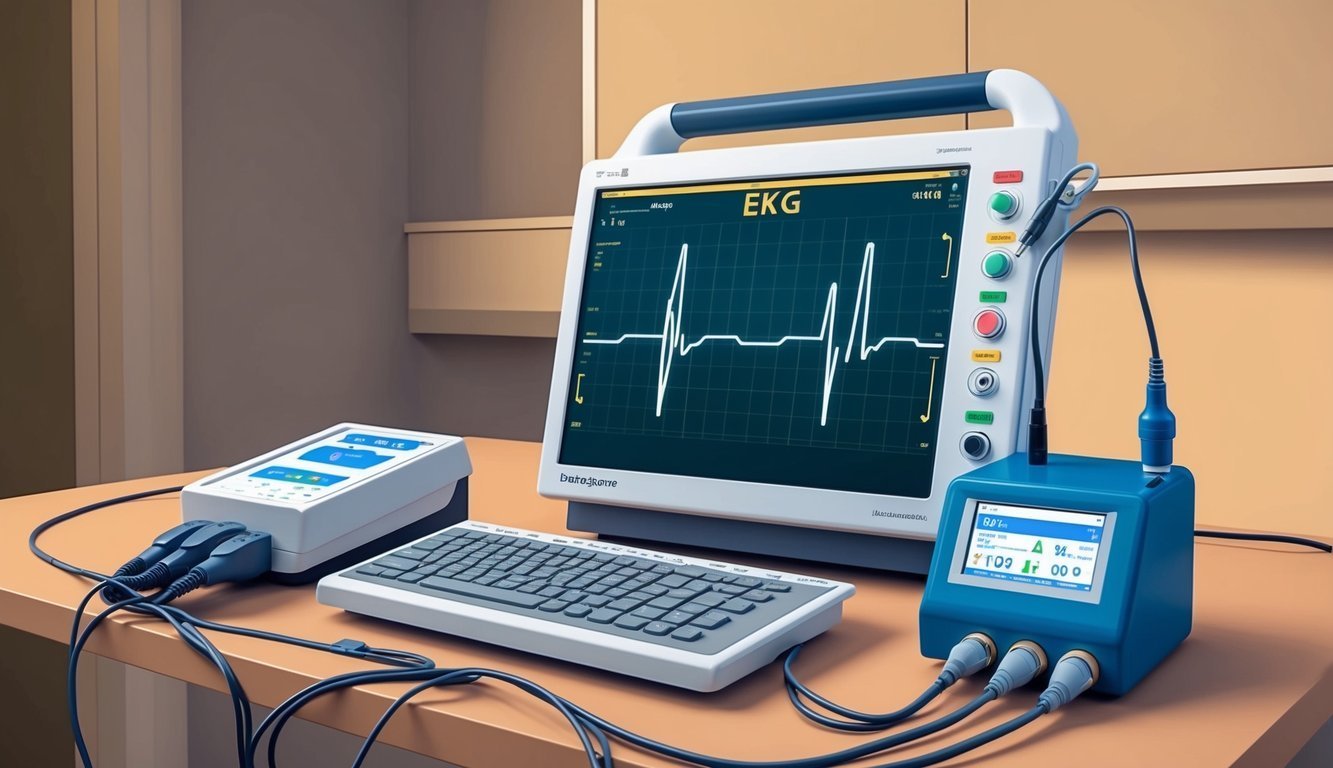The role of an EKG technician is crucial in the healthcare field.
These professionals specialize in measuring the heart’s electrical activity.
As of October 2024, the average salary for an EKG technician in the United States is approximately $24.45 per hour.
This salary can vary depending on factors such as location, experience, and work setting.
According to the Bureau of Labor Statistics, the demand for EKG technicians is expected to grow.
This makes it a promising career choice for those interested in the healthcare industry.
Understanding the salary landscape not only helps you set realistic expectations but also empowers you to negotiate better compensation.
You can explore detailed salary information by state and city through resources like Indeed and Nurse.org.
This blog post will delve into the various aspects that influence EKG technician salaries and provide insights on how you can enhance your earning potential within this rewarding healthcare career.
Understanding the Role of an EKG Technician
As an EKG technician, you play a crucial role in monitoring and assessing patients’ heart health through specialized testing.
Your responsibilities encompass operating advanced equipment and interacting directly with patients to provide essential care.
Daily Responsibilities
Your daily tasks include preparing patients for electrocardiogram (EKG) tests, which involves explaining the procedure and addressing any concerns.
You will apply electrodes to the patient’s skin and ensure they are comfortable during the test.
After conducting EKGs, you analyze the readings and document the results accurately.
This data is vital for physicians to diagnose cardiovascular conditions effectively.
You may also maintain and calibrate EKG machines to ensure they function correctly.
Utilizing various equipment, including cardiac monitors, is part of your role.
You may work in hospitals, outpatient care centers, or private practices, adapting to the specific needs of each environment.
Work Environment
You will find EKG technicians employed in diverse settings, including hospitals, outpatient care centers, and private practices.
Each environment presents unique challenges and pacing.
In hospitals, you might work with critically ill patients and be part of a larger healthcare team.
This setting often requires you to multitask and collaborate with other medical professionals, such as cardiovascular technicians and medical assistants.
In outpatient care or private practices, your focus may shift to routine tests on stable patients.
Here, patient interaction might be more straightforward since you typically deal with healthy individuals coming in for regular check-ups or referrals.
Patient Interaction
Patient interaction is a pivotal aspect of your role.
You need to establish trust and provide reassurance, as many patients may feel anxious about undergoing EKG tests.
Effective communication is key to ensuring patients understand the process and what to expect.
You are responsible for answering their questions and providing clear instructions on how to prepare for the test.
Additionally, your role involves monitoring patients during the procedure and being alert to any signs of distress.
This attentiveness not only helps maintain patient safety but also enhances their overall experience.
Education and Certification Requirements
To become a successful EKG technician, you need a strong educational foundation along with the right certification.
Understanding the necessary steps can help you streamline your preparation for this career path.
High School Education and Beyond
A high school diploma or equivalent is the essential first step toward an EKG technician career.
Courses in anatomy, physiology, and medical terminology provide a solid background for your future studies.
After high school, consider enrolling in specific EKG technician programs which focus on the skills needed for the role.
While not always required, further education can enhance your employability and salary potential.
Many employers prefer candidates who have completed additional training in cardiovascular technology or related fields.
EKG Technician Programs
Various EKG technician programs are available through community colleges, vocational schools, and online platforms.
These programs typically last from a few months to a year and include a mix of theoretical and hands-on learning.
Key components of these programs often include:
- Basic patient care skills
- Electrocardiography techniques
- Understanding of cardiac anatomy
- Knowledge of medical equipment and procedures
Upon completion, you should be well-equipped for on-the-job training and practical exams.
Programs may also offer flexibility with full-time and part-time options to fit diverse schedules.
Certification Process
Becoming a certified EKG technician often involves passing a certification exam.
The National Healthcareer Association offers the Certified EKG Technician (CET) certification.
To be eligible, you typically need:
- Completion of an accredited EKG technician training program
- The knowledge and skills to pass the certification exam
Many certification programs also require continuing education credits to maintain your credential.
This ensures you stay updated with the latest techniques and regulations in the field.
Preparing for the EKG certification exam can boost your job prospects and potentially lead to higher salary options.
Salary Insights and Trends
Understanding the salary landscape for EKG technicians involves examining national averages, regional variations, and specific factors influencing compensation.
This information can help you gauge potential earnings in this field.
National Averages
As of October 2024, the average salary for EKG technicians in the United States is approximately $43,400 per year or about $21 per hour.
According to the Bureau of Labor Statistics, salaries typically range from $34,039 to $56,391 annually.
The median salary falls around $43,340, which gives a clearer picture of what most technicians earn.
These figures indicate a steady demand for EKG technicians as healthcare services expand across the nation.
Regional Variations
Salaries can vary significantly by state and region, influenced by the cost of living and local demand for healthcare professionals.
For instance, EKG technicians in California may earn around $56,351, while those in states like Mississippi might see salaries close to $34,039.
Here’s a brief overview:
| State | Average Salary |
|---|---|
| California | $56,351 |
| Texas | $50,150 |
| New York | $48,000 |
| Florida | $40,000 |
| Mississippi | $34,039 |
Make sure to consider your location when assessing potential earnings, as these geographical factors play a crucial role in salary determinations.
Factors Influencing EKG Technician Salaries
Several factors influence the salaries of EKG technicians, including:
- Experience: More experienced technicians typically earn higher salaries.
- Certification: Holding relevant certifications can increase earning potential.
- Additional Skills: Specializations may lead to better job opportunities and higher pay.
The job market for EKG technicians is expected to grow, driven by advancements in cardiac care and diagnostic technology.
Continuous professional development can enhance your skills and possibly your salary, making it essential to stay updated in this evolving field.
Career Outlook and Advancement

The career outlook for EKG technicians is promising, with significant growth anticipated in the healthcare sector.
Understanding job market statistics and potential career paths will help you make informed decisions about your future.
Job Market Statistics
The U.S. Bureau of Labor Statistics (BLS) projects a 14% job growth for EKG technicians and related roles like cardiovascular technologists from 2020 to 2030.
This increase is attributed to the aging population and the rising prevalence of heart-related conditions.
In terms of salary, EKG technicians earn an average of $38,980 annually, according to data from August 2022.
Specific salaries can vary based on location, experience, and work setting.
For example:
| Location | Average Salary |
|---|---|
| Nationwide | $38,980 |
| California | $47,000 |
| Texas | $35,000 |
| Florida | $40,000 |
You can explore salary trends by region to better understand potential earnings.
Career Paths and Progression
As you gain experience as an EKG technician, there are various pathways for career advancement.
Many technicians choose to specialize in areas such as cardiac sonography or electrophysiology, which often command higher salaries and offer more challenging roles.
Additionally, pursuing certification can enhance your credentials and make you more competitive in the job market.
Certifications from organizations like the American Society of Echocardiography (ASE) can open doors to higher positions.
Networking within the healthcare field can also help you discover job openings and potential mentorship opportunities.
Consider joining professional organizations that focus on cardiovascular technology for ongoing education and career resources.
Essential Skills and Knowledge for Success

To excel as an EKG technician, you need a mix of technical skills and soft skills.
Mastery of both areas is crucial for accurate testing and effective patient interaction.
Technical Skills
As an EKG technician, you will work extensively with various types of EKG equipment.
Understanding how to operate machines and interpret EKG results is fundamental.
Proficiency in medical terminology is essential for effective communication.
You should be familiar with terms related to cardiac monitoring, arrhythmias, and types of heart disease.
Knowledge of anatomy and physiology allows you to understand the heart’s structure and function.
Skills in performing stress testing and operating a holter monitor are also valuable, as they provide insights into cardiac health.
Familiarity with basic life support procedures ensures patient safety during testing.
Your ability to conduct various EKG tests, including ambulatory EKG assessments, directly impacts patient outcomes.
Soft Skills and Personal Qualities
In addition to technical abilities, soft skills are vital for success as an EKG technician. Empathy and compassion enable you to support anxious patients effectively.
You will regularly encounter individuals concerned about their cardiovascular health.
So, you need to build trust through clear communication.
Being detail-oriented helps in accurately capturing and reporting EKG tests.
You should also demonstrate strong problem-solving skills to address any issues that may arise during procedures.
Teamwork is critical, as you will often collaborate with other healthcare professionals.
Possessing good organizational skills allows you to manage time efficiently and maintain accurate records of patients’ data.

